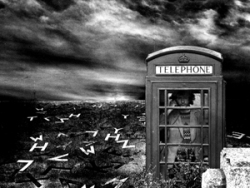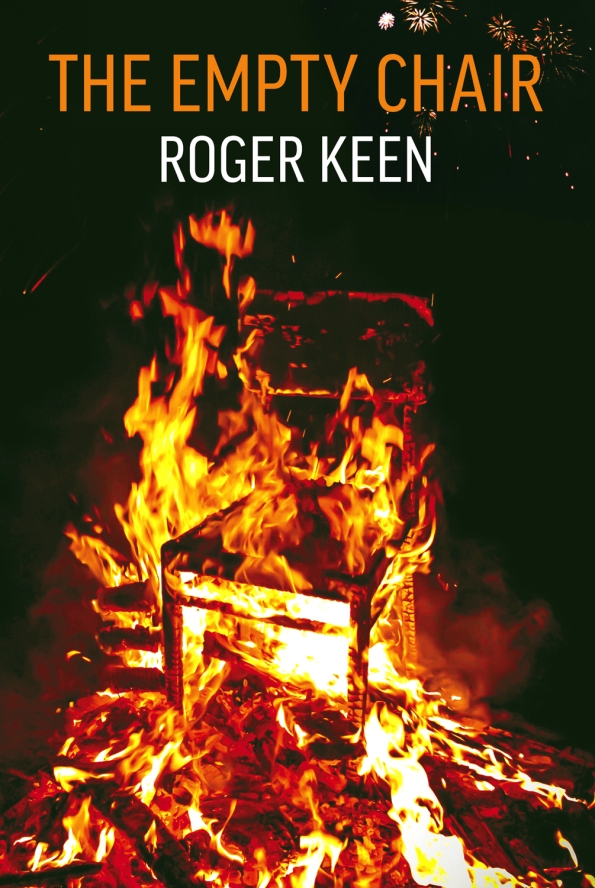Archive
Roger Keen Interview: “I find the best kind of inspiration comes from unexpected things”
Huge thank you to Hannah of The Dorset Book Detective for interviewing me about my writing and some of the ideas surrounding Literary Stalker.
 Roger Keen, filmmaker and psychological thriller writer, discusses his work and the influences behind it.
Roger Keen, filmmaker and psychological thriller writer, discusses his work and the influences behind it.
Tell me about how you came to define your writing style. What drew you towards writing thrillers?
When I started writing, I was initially drawn to literary fiction, particularly American countercultural writers such as Kerouac, Burroughs, Henry Miller and Richard Brautigan. But I also liked classic crime and noirish fiction, ranging from Poe and Conan Doyle to Raymond Chandler, Patricia Highsmith and Ruth Rendell. Later, I decided to write dark horror-type short stories, because there was a market for them in small press magazines, and literary stories were harder to place. The types of stories I liked to write were more psychological rather than supernatural, and more rooted in the real world than in the realms of Gothic fantasy. I was always interested in aberrant psychology and read about it widely, including true crime books…
View original post 1,043 more words
Literary Stalker, a Novel by Roger Keen
 Three years ago, in the autumn of 2014 – and extending into 2015 – I experienced a kind of creative fugue, which resulted in my entire ‘novelistic memoir’ approach to past, present and future extended works being rebased as pure fiction – but of the metafictional kind. As a result, Literary Stalker – an old idea from the 1990s – got a new lease of life, and The Empty Chair, my next intended novelistic memoir, got recalled to the workshop.
Three years ago, in the autumn of 2014 – and extending into 2015 – I experienced a kind of creative fugue, which resulted in my entire ‘novelistic memoir’ approach to past, present and future extended works being rebased as pure fiction – but of the metafictional kind. As a result, Literary Stalker – an old idea from the 1990s – got a new lease of life, and The Empty Chair, my next intended novelistic memoir, got recalled to the workshop.
As a psychological crime/horror novel, Literary Stalker would seem a large and radical departure from that novelistic memoir direction, and in some ways it is, but not in others. I did write psychologically-orientated crime, horror, fantasy and noir fiction back in the ’90s, having short stories published in various (now largely forgotten) small press magazines such as Psychotrope, Threads, Sierra Heaven and others with similarly freakish names. I also wrote two or three novels running along the same lines, which never saw the light of day, though one came close. This whole authorial thrust petered out in the late ’90s, and though I continued writing articles and reviews concerning weird and genre fiction and film, I lost the inspiration for actually creating such fiction myself. Instead, amongst other projects, I pressed on with more versions of the semi-autobiographical novels that would eventually be (almost!) de-fictionalised as The Mad Artist and The Empty Chair.
Though nominally a memoir, my previous book, The Mad Artist, is based as much on my attempts to turn its material into novels as it is on the events – the psychonautic adventures – themselves. That’s what gave me the incentive to write it in the form that I eventually chose – a self-begetting narrative with nested versions of itself and strong metafictional overtones. The Empty Chair also follows in that direction, but is taken much, much further. My creative journey of September 2014 onwards involved applying these same techniques to a piece of actual made-up fiction rather than assemblages of autobiography. And the ‘Literary Stalker’ project, which came from my horror-writing days of the ’90s, proved an ideal vehicle.
 What made the idea work, content-wise, was my rediscovery and multiple re-watching of a favourite hoary old horror movie of the 1970s: Theatre of Blood, staring Vincent Price as the deranged Shakespearian actor Edward Lionheart, who compiles a hit list of the critics who’ve given him bad reviews and then murders each one in a different theatrical setting taken from a Shakespeare play. My idea was to make Literary Stalker a pastiche of Theatre of Blood, where the narrator, Nick Chatterton, uses the plots of classic crime and horror films as the templates for the revenge murders of his enemies. But he’s not actually committing these murders, he is writing them up in his novel The Facebook Murders, and the story of Literary Stalker is the story of the composition of that novel-within-a-novel.
What made the idea work, content-wise, was my rediscovery and multiple re-watching of a favourite hoary old horror movie of the 1970s: Theatre of Blood, staring Vincent Price as the deranged Shakespearian actor Edward Lionheart, who compiles a hit list of the critics who’ve given him bad reviews and then murders each one in a different theatrical setting taken from a Shakespeare play. My idea was to make Literary Stalker a pastiche of Theatre of Blood, where the narrator, Nick Chatterton, uses the plots of classic crime and horror films as the templates for the revenge murders of his enemies. But he’s not actually committing these murders, he is writing them up in his novel The Facebook Murders, and the story of Literary Stalker is the story of the composition of that novel-within-a-novel.
The Facebook murders are actually being committed by Jago Farrar, Nick’s alter ego and narrator, and Jago himself is writing a novel – Social Media Avenger – based on his murders, which is narrated by Miles Hunniford…Etcetera! This might remind you of the wonderful model village in Bourton on the Water in the Cotswolds, which contains a model of itself, and a model of the model, and a model of the model of the model. And indeed it’s also like that sublime movie Synedoche New York, about an autobiographical playwright who gets to workshop his own life story, eventually needing to dramatise the workshopping itself, and then to dramatise the dramatisation of the workshopping, and so on infinitely, with actors playing actors playing actors…
So, in a sense Literary Stalker marks the completion of a circle or loop or Möbius strip between my old ’90s horror/crime work and the later meta-memoir tendency. The narrator, Nick Chatterton, is gay – for reasons which become clear as the novel progresses – and his creation was something of a challenge for a straight author…but that’s another story. I will be penning more pieces – and perhaps making some films – about the gay, homicidal and metafictional aspects of the work, so stay tuned.
More details about Literary Stalker can be found on the publisher site here: Darkness Visible.
An excellent review by Noel Megahey appears here on The Digital Fix: Geek Life.
It is available as a paperback and on Kindle in the UK here: Amazon.co.uk
And in the United States here: Amazon.com. Also on other Amazons worldwide.
‘Man of Letters’

LSD-inspired photomontage described in Chapter 17 of The Mad Artist
Pages
Recent Posts
Categories
- Blu-ray Writings (2)
- Book Excerpts (5)
- Cinema (18)
- Drug-Lit Classics (2)
- General Drug Lit (13)
- General Literature (17)
- Interviews (7)
- Literary Stalker (24)
- Man of Letters (1)
- Metacrime (18)
- Psychedelic Literature (30)
- Psychology & Psychotherapy (7)
- Short Films (3)
- Social Media (1)
- Talks & Conferences (2)
- Television (1)
- The Empty Chair (5)
- The Mad Artist (17)
- Triskaidekaphobia (1)
Archives
- August 2023
- July 2023
- April 2023
- March 2023
- January 2023
- December 2022
- October 2022
- January 2022
- October 2021
- August 2021
- May 2020
- February 2020
- August 2019
- July 2019
- February 2019
- December 2018
- November 2018
- October 2018
- September 2018
- June 2018
- May 2018
- April 2018
- March 2018
- February 2018
- December 2017
- November 2017
- October 2017
- August 2017
- March 2017
- January 2017
- December 2016
- November 2016
- April 2016
- January 2016
- November 2015
- October 2015
- August 2015
- July 2015
- November 2014
- October 2014
- September 2014
- August 2014
- February 2014
- September 2013
- June 2013
- May 2013
- April 2013
- January 2013
- September 2012
- July 2012
- February 2012
- December 2011
- November 2011
- August 2011
- May 2011
- March 2011
- December 2010
- October 2010
- August 2010
- July 2010
- June 2010
- May 2010

